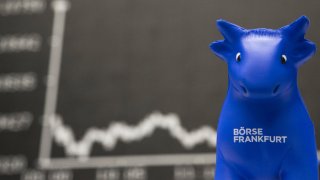
- Julian Teicke, the founder of $3 billion insurance start-up Wefox, believes Germany's blue-chip DAX index will be taken over by tech names in the next decade.
- Only a handful of tech names are listed among the 40 DAX constituents, including SAP, Infineon, Delivery Hero, Zalando and Hellofresh.
- German start-ups have pulled in a record 15.3 billion euros ($17.4 billion) in funding from investors so far this year, according to Dealroom figures.
Germany's blue-chip DAX index is going to look a whole lot different by 2030, according to the CEO of insurance start-up Wefox.
Watch NBC6 free wherever you are
Julian Teicke, who co-founded the $3 billion firm in 2015, told CNBC in an interview that he believes the 40-company benchmark will be taken over by tech names in the next decade.
"'Software is eating the world, that's clear," Teicke told CNBC, echoing a famous phrase from Silicon Valley venture capitalist Marc Andreessen.
Get local news you need to know to start your day with NBC 6's News Headlines newsletter.
"If we look at Germany, for example, it's pretty clear that the DAX in 2030 will be dominated by tech companies," Teicke said.
"We've seen that in the U.S., and now it's Germany's time. Some of the major companies that are today in the DAX, by 2030, will not be in the DAX anymore."
Currently, only a handful of tech names are listed among the 40 constituents that make up the DAX. Those include SAP, Infineon, Delivery Hero, Zalando and Hellofresh.
Money Report
While Germany is known for its prowess in manufacturing and sectors like autos and machinery, it is yet to produce a tech company the size of giants in the U.S. and China.
The country also lags behind Britain when it comes to venture capital investment. But up-and-comers like Teicke hope that will change soon.
Surging start-up valuations
Wefox is one of several privately-held German tech companies that have reached multibillion-dollar valuations recently. The firm raised $650 million in a monster funding round earlier this year.
Another company defying gravity in Germany is Celonis. The Munich and New York-headquartered software company raised $1 billion at an $11 billion valuation in June, making it Germany's only so-called "decacorn" with a market value above $10 billion.
Alex Rinke, Celonis' CEO and co-founder, said ballooning funding rounds for German tech companies was reminiscent of the country's so-called "founders' period" in the late 19th century, an economic boom that preceded a stock market crash.
"I think that now this German founders' period is getting reinvigorated," Rinke told CNBC.
"When the internet first came up, the mistake the German companies did was they started companies with a German ambition. There was a Facebook for Germany, an eBay for Germany."
The German start-up incubator Rocket Internet, for example, often received criticism for producing "copycats" of successful American tech companies.
"All this stuff, it all went away," Rinke said. "It didn't stand the test of time because digital technology doesn't respect boundaries. It doesn't respect geographical borders.
"I think this is why it is so important that Germany revives this entrepreneurial spirit that we arguably had in a big way more than a century ago."
Growing IPO pipeline
Teicke said Germany was seeing a new crop of German tech IPO candidates emerge after successful floats from the likes of Delivery Hero, Zalando and Hellofresh, which are now collectively worth over $75 billion.
"There's a major wave coming and flooding over the DAX, and it's going to be tech companies," he said.
So far this year, German start-ups have pulled in a record 15.3 billion euros ($17.4 billion) in funding from investors, according to Dealroom figures, more than double the 6.1 billion euros of capital raised in the country throughout the whole of 2020.
"I do think Germany has a real advantage," Henry Gladwyn, a partner at Wefox backer Omers Ventures, told CNBC. "And that real advantage is the size of the home market and the cultural difference of the home market."
The main factors attracting investors to Germany are its quality of university education, a growing pool of talent with experience at global companies, and the size of the German-speaking DACH (Germany, Austria and Switzerland) region, Gladwyn said.
Still, a surge in private start-up valuations has fueled fears that a new "dotcom" bubble may be looming. Market bears have long warned of a coming correction for publicly-listed tech stocks. Whether they're right remains to be seen.
"I don't think it's crazy," Teicke said, referring to climbing tech valuations in his home country. "I think it's well-substantiated and not a bubble. It's really based on fundamentals and proof points that we've seen in the U.S."
Opportunity ahead
With Angela Merkel's tenure as chancellor now drawing to an end, German start-up executives say the country has a chance to compete with the U.S., China and Britain — especially post-Brexit — in innovative new sectors like clean energy and climate tech.
"We have to make sure that we continue to lead and take an even bigger lead in the sustainability revolution because that is an opportunity for us to get ahead," Rinke said.
"Sustainability is something where we have an opportunity to get ahead because other countries are sleeping on this. In the U.S., they are starting but are still early, and in China they're sleeping completely."
Gladwyn warned that the danger for Germany is that it "ends up like Japan," which is home to many culturally-relevant brands like Sony and Toyota, but has an aging population and is struggling to produce new tech ventures.
"The days of Sony are kind of behind us," Gladwyn said. "There are not start-ups, there are not new companies emerging in Japan. It's just locally relevant companies, because China really dominates the rest of Asia."
"The risk for Germany is that the whole journey ends up becoming a bit like Japan. It's rich, its population is getting older, there are these great, storied, historic companies. But they're not producing anything new."






